最新人教版七年级英语下unit4复习课件教学讲义ppt课件
合集下载
人教版七年级下册unit4知识点总结复习课件(PPT共54页)
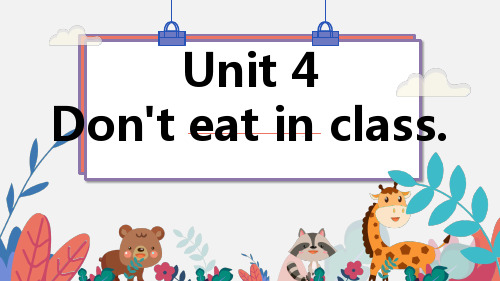
辨析listen和hear
1)listen强调听的动作 2)hear 强调听的结果 eg. 请听我说.
Please listen to me.
eg. 你能听到我吗? Can you hear me?
5. in class 在课堂上/上课时 1) after class下课后 2) in the class 在班里 3) in the classroom 在教室里 eg. 1) 上课时不要吃东西. 2) 在教室里不要吃东西. 3) 她是班里最优秀的学生.
3)Let型祈使句 肯定结构:Let sb. do sth 让某人做某事 否定结构: ① Don′t let sb. do sth 不要让某人做某事 ② Let sb. not do sth 让某人不要做某事 eg:1) 让我们打篮球吧 2) 不要让他进来。
4)No 型祈使句(表示否定含义) 结构:No + n/v-ing. 禁止... eg:1)禁止钓鱼
否定结构:Don′t +实意动词原形+其他=
You mustn't + 动词原形+其他 不许.../禁止...
eg: 1) 请给我一本书。
2)听我说。
3)不要在教室里吃东西。 4)不要在走廊里跑。
2)Be型祈使句 肯定结构:Be+形容词+其他 否定结构:Don′t + be +形容词+其他
eg:1) 安静点。 2) 快一点。 3)上课不要迟到。 4)别害羞。
3)in+颜色/服装n 表示穿着...颜色的衣服 eg:穿着红色衣服的女孩是我的妹妹。 4) dress sb 给某人穿衣服 eg:我妈妈每天早上给我弟弟穿衣服 5) get dressed 穿上衣服,强调动作 eg:请你起床穿好衣服。
人教版七年级英语下册Unit4教学课件(78张PPT)

Don’t eat in class
How many rules(规定) can you hear? Rule1Don’t(不要) touch (触摸)anything Rule2 Don’t(不要) disturb(打扰) me when I’m working
Rule3Don’t(不要) make any noise(噪音)
2a Listen. Check (√) the activities Alan and Cindy talk about.
Activity
1.___ listen to music in the classroom or hallways
run in the hallways (在走廊
里跑)
hallway(走廊)
A: Can we run in the hallways(走廊)
B: No, we can’t
A: Can you eat in the classroom
B:No we can’t
Rule 3 Don’t eat in the classroom. You must eat in the dining hall
13、He who seize the right moment, is the right man.谁把握机遇,谁就心想事成。2021/7/202021/7/202021/7/202021/7/207/20/2021
14、谁要是自己还没有发展培养和教育好,他就不能发展培养和教育别人。2021年7月20日星期二2021/7/202021ss
( ) draw (画)on the wall(墙上)
( ) fight
( ) eat in the dinning hall
How many rules(规定) can you hear? Rule1Don’t(不要) touch (触摸)anything Rule2 Don’t(不要) disturb(打扰) me when I’m working
Rule3Don’t(不要) make any noise(噪音)
2a Listen. Check (√) the activities Alan and Cindy talk about.
Activity
1.___ listen to music in the classroom or hallways
run in the hallways (在走廊
里跑)
hallway(走廊)
A: Can we run in the hallways(走廊)
B: No, we can’t
A: Can you eat in the classroom
B:No we can’t
Rule 3 Don’t eat in the classroom. You must eat in the dining hall
13、He who seize the right moment, is the right man.谁把握机遇,谁就心想事成。2021/7/202021/7/202021/7/202021/7/207/20/2021
14、谁要是自己还没有发展培养和教育好,他就不能发展培养和教育别人。2021年7月20日星期二2021/7/202021ss
( ) draw (画)on the wall(墙上)
( ) fight
( ) eat in the dinning hall
人教版七年级英语下册unit4全单元分课时课件,共有129张ppt

We can eat in the dining hall.
Don’t eat in the classrooms.
in a hallway
A:Can we run in the hallways?
.
B:No,we can’t.We can’t run in the hallways.
A:So,don’t run in the hallways.
Don’t play sports in the classrooms.
school rules keep/obey the rules 遵守规则 break the rules 违反规则
What rules are these students breaking?
1. Don’t arrive late for class. 2. Don’t run in the hallways. 3. Don’t eat in the classroom. 4. Don’t listen to music in the
--What else can’t you do in our school? --We can’t….in our school.
What else can’t we do?
We can’t eat in the classroom. We can’t play sports in the classroom We can’t run in the classroom. We can’t speak loudly in the classroom
肯定 . Come in, please! 请进! Sit down, please. 请坐。
Grammar
祁使句
Example: 肯定祁使句
Don’t eat in the classrooms.
in a hallway
A:Can we run in the hallways?
.
B:No,we can’t.We can’t run in the hallways.
A:So,don’t run in the hallways.
Don’t play sports in the classrooms.
school rules keep/obey the rules 遵守规则 break the rules 违反规则
What rules are these students breaking?
1. Don’t arrive late for class. 2. Don’t run in the hallways. 3. Don’t eat in the classroom. 4. Don’t listen to music in the
--What else can’t you do in our school? --We can’t….in our school.
What else can’t we do?
We can’t eat in the classroom. We can’t play sports in the classroom We can’t run in the classroom. We can’t speak loudly in the classroom
肯定 . Come in, please! 请进! Sit down, please. 请坐。
Grammar
祁使句
Example: 肯定祁使句
人教版英语七年级下册Unit4PPT课件
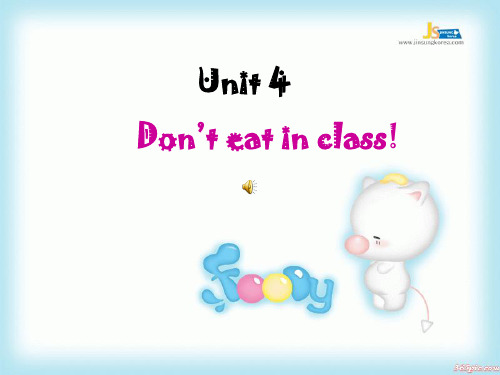
3:remember doing sth记得做过某事(做了)
如: I remember taking a desk to Tom
我记得已经拿给Tom了(已经做过了)
Do you remember __jion my party tomorrow,Alice
I can remember __your party last month.
3: learn from 向。。。学习
如:You should learn from Bob
你应该向Bob学习
4:learn about 学习什么 ,了解什么
如:I want to learn about history
2021/7/23
33
1. have fun玩的开心--have great fun玩的很开心 如:We always have great fun at parties 我们在聚会上总是玩的很开心
2.feel系动词----感受,觉得
feel sb do sth 感到某人做某事}这件事情已经发 生了
feel sth do sth感到某物做某事}这件事情已经发 生了
如:I felt a cat eat my food.(食物已经被吃了)
2021/7/23
25
1. feel sb/sth doing sth感到某人/某物正在做某 事(现在正在做的事情)
:
2:lucky(形容词)幸运的 You are lucky你是幸运的
3:unlucky(形容词)不幸运的
2021/7/23
30
1. keep (v) 使....保持
keep sb /sth +形容词/介词短语
表示:某人或某物保持某个状态
人教版英语七年级下册 Unit 4 单元巩固与复习 课件(共25张PPT)
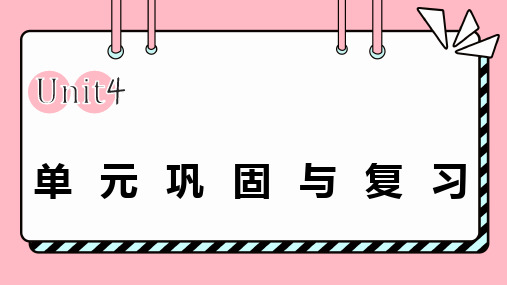
6. 我不得不留短发。 I have to keep my hair short.
句型分析 1. Don’t arrive late for class. 1)这是一个表示否定的祈使句,祈使句表示请求、命令或者建议。 谓语动词用原形,句子的主语you通常省略。 句子结尾用句号,表示强烈语气的时候用感叹号, 朗读时要用降调。 可以在句末或者句首加上please, 使语气更加的缓和客气。 please 放在句首时后面不需要加逗号,放在句末时后面要加逗号。 例如:Listen to your teacher, please. 请听你的老师讲话。
Clark [kla:k]克拉克(姓;男名) Amy [eɪmɪ]埃米(女名) Molly['mɒlɪ]莫莉(女名) New York [nju: jɔ:k]纽约 arrive [ə'raɪv]v.到达 wear [weə]v.穿;戴 bring [brɪŋ]v.带来;取来 listen ['lɪs(ə)n]v.听;倾听 relax [rɪ'læks]v.放松;休息
have to 不得不have to 得不be quiet 安静
be quiet 安静
make breakfast 做早饭 make breakfast 做早饭
be noisy 吵闹
be noisy 吵闹
keep one’s hair short 留短ke发ep one’s hair short 留 play with sb. 和某人一起短玩发 play the piano 弹钢琴 play with sb. 和某人一
Don’t look out of the window. 不要向窗外看。 Please come in. = Come in, please. 请进。
句型分析 1. Don’t arrive late for class. 1)这是一个表示否定的祈使句,祈使句表示请求、命令或者建议。 谓语动词用原形,句子的主语you通常省略。 句子结尾用句号,表示强烈语气的时候用感叹号, 朗读时要用降调。 可以在句末或者句首加上please, 使语气更加的缓和客气。 please 放在句首时后面不需要加逗号,放在句末时后面要加逗号。 例如:Listen to your teacher, please. 请听你的老师讲话。
Clark [kla:k]克拉克(姓;男名) Amy [eɪmɪ]埃米(女名) Molly['mɒlɪ]莫莉(女名) New York [nju: jɔ:k]纽约 arrive [ə'raɪv]v.到达 wear [weə]v.穿;戴 bring [brɪŋ]v.带来;取来 listen ['lɪs(ə)n]v.听;倾听 relax [rɪ'læks]v.放松;休息
have to 不得不have to 得不be quiet 安静
be quiet 安静
make breakfast 做早饭 make breakfast 做早饭
be noisy 吵闹
be noisy 吵闹
keep one’s hair short 留短ke发ep one’s hair short 留 play with sb. 和某人一起短玩发 play the piano 弹钢琴 play with sb. 和某人一
Don’t look out of the window. 不要向窗外看。 Please come in. = Come in, please. 请进。
人教英语七年级下册Unit4复习课件 共21张PPT
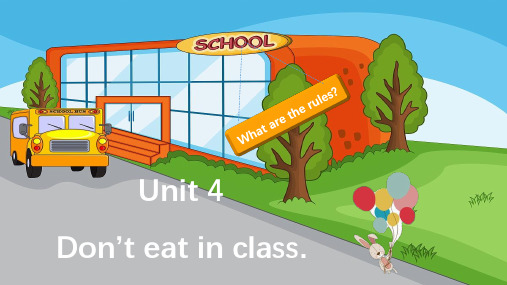
My mom ______ ______ on weekends. 5. 我们必须遵守交通规则。
We must _________ the traffic _________.
Mr. Green: Who is listening to music in the classroom? Dale: It’s me. I’m sorry, Mr. Green. Mr. Green : (1)________________________________ Dale: I know. I won’t do that again. Mr. Green: What are the two girls talking about? (2) ___________________. Linda & Mary : Shush…the teacher asks us not to talk. Mr. Green: Listen to me carefully, class. What does this sign mean? It means “____________________”. Mr. Green: Yes, so we can’t fish when we see the sign.
after school.
After _e_a_t_i_n__g_ dinner, I can’t relax _e__i_t_h_e__r_(也). I can watch TV ___a_f_t_e__r_ __r_e__a_i_n_g__ a book. It is _t_e__r_r_ib__l_e_ for me to have so many rules.
A. must
B. can
C. has to
We must _________ the traffic _________.
Mr. Green: Who is listening to music in the classroom? Dale: It’s me. I’m sorry, Mr. Green. Mr. Green : (1)________________________________ Dale: I know. I won’t do that again. Mr. Green: What are the two girls talking about? (2) ___________________. Linda & Mary : Shush…the teacher asks us not to talk. Mr. Green: Listen to me carefully, class. What does this sign mean? It means “____________________”. Mr. Green: Yes, so we can’t fish when we see the sign.
after school.
After _e_a_t_i_n__g_ dinner, I can’t relax _e__i_t_h_e__r_(也). I can watch TV ___a_f_t_e__r_ __r_e__a_i_n_g__ a book. It is _t_e__r_r_ib__l_e_ for me to have so many rules.
A. must
B. can
C. has to
人教版七年级下册Unit 4 单元知识梳理词句复习课件(共39张PPT)

2. get to + 地点名词:
How do you usually get to school? 你通常怎么到学校?
3. reach 是及物动词,后边直接跟地点名词。
When she reached the office, the teacher was having a short rest. 当她到达办公室
Ⅱ. 用括号中所给单词的适当形式填空。 1. We have to ______ (wear) uniforms to school every day. 2. Jim ______ (have) to brush his teeth before going to bed. 3. My mother often asks me to practice_______ (play) the violin. 4. Don’t ______ (bring) music players to school. 5. Don’t be_____( noise) in the library. 6. Everyone feels______ (relax) when they listen to light music. 7. The weather is ______ (terrible) hot. 8. Does Jack ______ (do) his homework on time? 9. She ______ (not like) playing basketball. 10. I have to ______ (get up) at six o’clock.
例如:
Please dry the dishes and put them away. 请你把餐具擦干, 收拾好。 plate 指较平的盘子、碟子, 可用来盛汤,也可用来装菜。 例如:
人教版七年级下册unit4复习(PPT50张
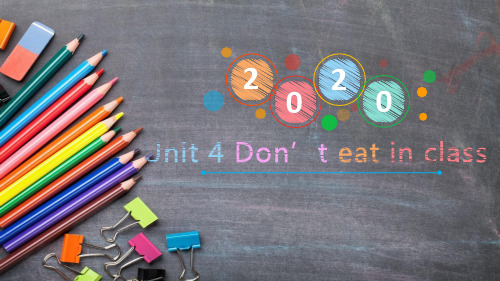
wash/do the dishes
精编优质课PPT人教版七年级下册unit 4复习(PPT50张)(获奖课件推荐下载)
run in the hallways
Your sister is asleep now.
help his mother make breakfast
Grammar---情态动词must
精编优质课PPT人教版七年级下册unit 4复习(PPT50张)(获奖课件推荐下载)
祈使句Imperative Sentence
表示请求,建议,命令,禁止,叮嘱等语气的句子, 其
结构为省去主语you, 以动词原形开头的简单句 。
Be quiet !
命令
Be good to your sister !
精编优质课PPT人教版七年级下册unit 4复习(PPT50张)(获奖课件推荐下载)
祈使句Imperative Sentence
句子结构:
肯定祈使句:__________+ 其他
否定祈使句:_________+__________+ 其他
精编优质课PPT人教版七年级下册unit 4复习(PPT50张)(获奖课件推荐下载)
Grammar---祈使句Imperative Sentence
结构为省去主语you, 以动词原形开头的简单句 。 mustn't 禁止
精编优质课PPT人教版七年级下册unit 4复习(PPT50张)(获奖课件推荐下载) —Yes,_______.
Turn down the TV, please.
Be quiet ! ②由 must引起的疑问句,肯定回答一般用 must,否定回答一般用 needn’t 或 don‘t/ doesn’t have to,意思是“不必,不需要”;must 的否定
人教七下Unit4复习课件(共14张PPT)

B. brings C. to bring
D. bringing源自( )3.You don’t_______ wash all the plates after meals.
A. have to B. must C. may
D. has to
( )4.Bob can not come out to play because he______ help his dad
语法回顾练习题
( )1.The doctor says to Tom, “_______stay up too late. ”
A. Doesn’t B. Can’t
C. Don’t
D. No
( )2.Lucy,___________your homework here tomorrow.
A. bring
e.g. Do they have to go home now?他们得现在回家吗? e.g. You don’t have to go if you don’t want to.如果你不想去,你就不必去。
语法回顾 2. must的用法: (1)表示主观的义务和必要,主要用于肯定句和疑问句,意思是“必须……”; 由must引导的疑问句,肯定回答一般用must,否定回答一般用 needn’t 或 don't/doesn’t have to,意思是“不必” ; must 的否定形式 mustn’t表禁止,意思是“不能,不许' 例:—Must I finish my homework before five o’clock?
五点之前我必须完成家庭作业吗?
—Yes, you must. /No,you needn’t. /No,you don’t have to. 是的,你必须完成。/不,你没必要。 例:You mustn’t be late for school.你上学千万不要迟到。 (2)表示肯定的猜测,常用于肯定句,意为“一定是,必然……”。 例:You must be very tired.你一定很累 了。 例:Mary must be in the library.玛丽一定在图书馆里。
七年级下册第四单元英语课件(人教版).ppt

6. 在餐厅吃东西
说唱下列歌谣:
Be polite to each other. Wear school uniform. Don’t be late for school.
Don’t say rude remarks in school. Don’t eat snacks in class. Don’t shout in class.
Rain! Rain! Go away! Come again another day! Little Johnny wants to play.
Rain! Rain! Go away! Come again another day! It's mother's washing day.
hallway
2) 作名词,意为“打架;争吵”; 常用词 组have a fight“打架;吵架” Did you have a fight with her? 你和她吵过架吗?
4. wear 意为“穿、戴” My aunt wears a blue skirt and a white T-shirt. 我姑姑穿着蓝色的裙子,白色的T恤。 Does he wear glasses? 他戴眼镜吗?
练一练:用have to, must 填空 1. It’s cold outside. We _h_a_v_e_t_o stay at
home. 2. We _m_u_s_tbe good with our parents.
将下列句子译成英语。
1. 不要在上课时听音乐。 D__o_n_’t__li_st_e_n__to__m_u_s_i_c_i_n_c_l_a_s_s.__
5
hallways.
3. Don’t eat in the
人教版七年级下册英语第四单元课件资料.ppt
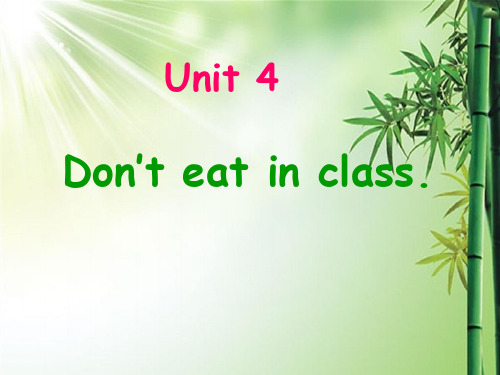
Practice 根据句意,用can和can’t填空。
1.Mr Green can’t smoke here, because there’s a sign on the wall. It says “No smoking.”
2.It’s very hot outside. You can wear a hat. 3.We can’t eat in the classroom, because
Don’t eat in the classroom.
School Rules
Don’t listen to music in the classrooms or the hallways.
School Rules Don’t fight.
School Rules
Don’t talk in class. Don’t talk with each other in class.
School Rules
Don’t sleep in class.
School Rules
Don’t use mobile phone in class.
School Rules
Don’t smoke. (No smoking)
We can’t rule the country without rules.
talk about rules
谈论规则
break the rules
违反规则
break the school rules 违反校规
break the class rules 违反班规
拓展
祈使句
一、祈使句的分类
祈使句表请求、命令、叮嘱、邀请、劝告 等。祈使句分为第二人称祈使句及第—、 三人称祈使句两大类。
人教版七年级英语下册Unit4复习课件(共25张PPT)
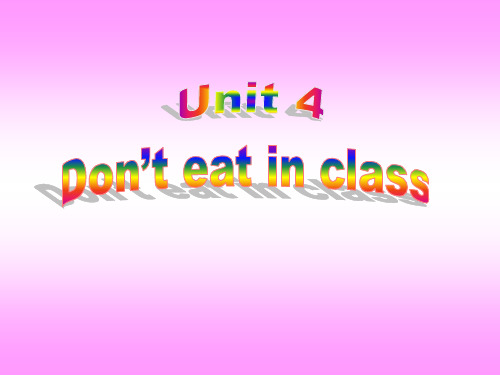
Please put on your new coat.
2 must have to的区别
1) must 作为情态动词,表示从主观上认 为有义务,有责任做某事。例如: 你(们)明天必须要来。 You must come tomorrow. have to 表示受外界条件制约而不得不 做某事
他不得不早起。 He has to get up early every morning.
Can we bring music players to school? 10.我们总是不得不穿校服。 We always have to wear the school uniform.
11.我们也不得不在图书馆里保持安静。 We also have to be quiet in the library. 12.这有太多的规则。 There are too many rules.
4.不要在课堂上吃东西。 Don’t eat in class. No eating in class.
wear, dress 与 put on的区别 wear强调“穿着”这一状态,也可表示 “戴着”.
We must wear the school uniform at school.
如:在学校里我们必须穿校服。
22练习做某事 23洗盘子
24看电视 25 做早饭 26打扫房间 27 在上学期间的 晚上 28 在上学日 29每周六
practice doing sth do the dishes wash the dishes watch TV make breakfast clean the room on school nights
also,too和either辨析
also通常放在句中,位于be 动词,助动词 或情态动词之后,实意动词之前 例如: Peter also has two brothers. I am also a student. Mrs. Green can also sing the song in Chinese.
七年级下册第四单元英语课件(人教版).ppt
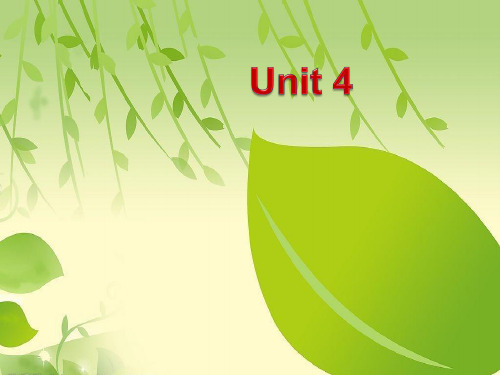
2) 作名词,意为“打架;争吵”; 常用词 组have a fight“打架;吵架” Did you have a fight with her? 你和她吵过架吗?
4. wear 意为“穿、戴” My aunt wears a blue skirt and a white T-shirt. 我姑姑穿着蓝色的裙子,白色的T恤。 Does he wear glasses? 他戴眼镜吗?
练一练:用have to, must 填空 1. It’s cold outside. We _h_a_v_e_t_o stay at
home. 2. We _m_u_s_tbe good with our parents.
将下列句子译成英语。
1. 不要在上课时听音乐。 D__o_n_’t__li_st_e_n__to__m_u_s_i_c_i_n_c_l_a_s_s.__
eat in the dining hall. 4. Don’t listen to music in class. 5. Don’t fight.
Tell your classmate what the rules should be.
Don’t fight with your classmates.
in 2a.
Well, we can’t listen to music
What are the
in the classroom or hallways.
school rules, Alan? But we can listen to music in
music room.
Uh-huh.
We can’t eat in the classroom, but we can eat in the dining hall.
4. wear 意为“穿、戴” My aunt wears a blue skirt and a white T-shirt. 我姑姑穿着蓝色的裙子,白色的T恤。 Does he wear glasses? 他戴眼镜吗?
练一练:用have to, must 填空 1. It’s cold outside. We _h_a_v_e_t_o stay at
home. 2. We _m_u_s_tbe good with our parents.
将下列句子译成英语。
1. 不要在上课时听音乐。 D__o_n_’t__li_st_e_n__to__m_u_s_i_c_i_n_c_l_a_s_s.__
eat in the dining hall. 4. Don’t listen to music in class. 5. Don’t fight.
Tell your classmate what the rules should be.
Don’t fight with your classmates.
in 2a.
Well, we can’t listen to music
What are the
in the classroom or hallways.
school rules, Alan? But we can listen to music in
music room.
Uh-huh.
We can’t eat in the classroom, but we can eat in the dining hall.
相关主题
- 1、下载文档前请自行甄别文档内容的完整性,平台不提供额外的编辑、内容补充、找答案等附加服务。
- 2、"仅部分预览"的文档,不可在线预览部分如存在完整性等问题,可反馈申请退款(可完整预览的文档不适用该条件!)。
- 3、如文档侵犯您的权益,请联系客服反馈,我们会尽快为您处理(人工客服工作时间:9:00-18:30)。
【用法辨析】wear与put on的区别
“穿着”, 强调穿的状态, 另外还可指戴帽子、 wear
戴眼镜等
put on
“穿上”, 强调穿的动作【活学活来自】①Tom often
a black sweater.
A. puts on
B. wears
C. on
②请穿上你的雨衣。外面正在下雨。
D. in
Please 答案: put on
【用法辨析】listen与hear的区别
【活学活用】
①听! 你能听见汤姆正在唱歌吗?
! Can you
Tom singing now?
②不要在会上听收音机。
Don’t
the radio in the meeting.
答案: ①Listen; hear ②listen to
4. We can’t wear a hat in our school. 在我们学校里不允许戴帽子。 【自主领悟】wear“穿; 戴”, 表示状态。相当于be in。例如: He is wearing a black T-shirt. 他穿着一件黑色的T恤衫。
2. • 10. make (one’s) bed 铺床
• 11. be noisy 吵闹
12.
4.
keep one’s hair short 留短发
6. • 13. play with sb. 和某人一起玩
• 14. play the piano 弹钢琴
8. • 15. have fun 玩得高兴
◆短语归纳
• 1. on time 准时,按时 listen to … 听……
• 3. in class 在课上 be late for 做……迟到
• 5. have to 不得不 be quiet 安静
• 7. go out 外出 do the dishes 清洗餐具
• 9. make breakfast 做早饭
your raincoat. It’s raining outside.
Does he have to wear a uniform at school? 在学校里他必须穿着校服吗?
【自主领悟】(1)have to为情态动词, 意为“必须, 不得不”, 后 接动词原形, 有人称、时态和数的变化。其第三人称单数形式 为has to, 过去式为had to。例如: It’s too late. I have to go home. 太晚了。我必须回家了。 (2)have to的否定形式和疑问形式要借助于do/does/did等助动 词来表示。例如: You don’t have to clean the room now. 你现在没必要打扫房间。
【用法辨析】arrive与get的异同点 相同点 跟home, here和there等地点副词时, 用法相同 arrive跟大地点类名词时用介词in, 跟小地点类名 不同点 词用介词at。get后跟地点类名词时只能用介词to
【活学活用】
①Our teacher arrives
school at 7: 30 every morning.
A. in
B. to
C. at
②He gets to the city by train. (改为同义句)
D. of
He
the city by train.
答案: arrives in
2. You must be on time. 你必须准时。 【自主领悟】on time“准时”, 指按照规定的时间做某事。例 如: Please come here on time tomorrow. 请明天按时来这里。
【用法辨析】on time与in time的区别 in time及时(在时间到来之前) on time按时(在规定时间内)
The doctors arrived in time and saved the injured man. 医生及 时到达, 救了那位受伤者。
She goes to work on time every day. 她每天 按时上班。
B. in time
C. for the first time D. all the time
3. Don’t listen to music in class. 在课堂上不要听音乐。 【自主领悟】(1)listen“听”, 是不及物动词, 其后接宾语时要 加介词to。例如: Listen to the teacher carefully in class. 在课堂上认真听老师讲课。 (2)in class是固定短语, 意为“在上课; 上课时”。例如: Don’t talk in class. Listen to the teacher. 不要讲话。注意听讲。
【活学活用】
①It’s important to be
for the meeting.
A. on time
B. in time
C. at any time
D. at the same time
②The firemen got to the factory
and put out the fire.
A. on time
16.
make rules 制订规则
1. Don’t arrive late for class. 上课不要迟到。 【自主领悟】(1)arrive意为“到达”, 是不及物动词, 跟地点 名词作宾语时要加介词。例如: I can arrive here at 8: 00. 我能在八点钟到这里。 (2)arrive late for相当于be late for, 为固定短语, 意为“(做某事 )迟到”。例如: Don’t arrive late for the meeting. 开会别迟到了。
You
wear your school uniform
today. ③你必须买票进电影院。
【用法辨析】have to与must的区别
have to
强调客观上要求“不得不”
must
强调个人主观感觉“必须; 有必要”。没有人 称、时态和数的变化。mustn’t意为“禁止”
【图解助记】
【活学活用】
①他今天得去看望他爷爷。
He
visit his grandfather today.
②今天你不必穿校服。
